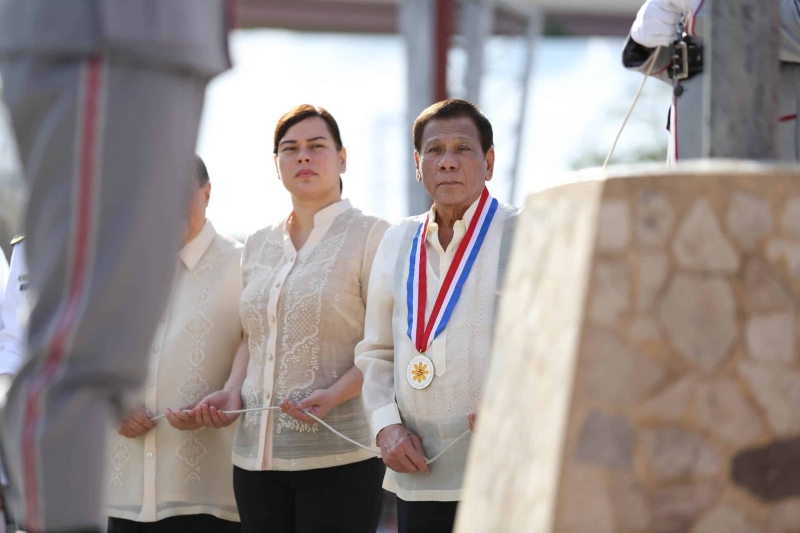FILE PHOTO: This December 30, 2019, shows President Rodrigo Duterte and his daughter, Davao City Mayor Sara Duterte-Carpio during the commemoration of the 123rd Anniversary of the martyrdom of Dr. Jose Rizal at the Rizal Park in Davao City. RICHARD MADELO/PRESIDENTIAL PHOTO
MANILA, Philippines — An independent news group has uncovered a network of X accounts with Chinese names that have been spreading fake news and fueling discord among Filipinos, especially when members of the Duterte family are being criticized.
During a House of Representatives tri-committee hearing, PressOne.PH multimedia editor Niceforo Balbedina revealed that as of 11:00 a.m. on Tuesday, they had discovered 107 accounts that were originally from Spanish-speaking nations but were converted to display Chinese names.
Posts from these accounts centered on the West Philippine Sea dispute, ridicule of Philippine Coast Guard officials, debunked accusations against President Ferdinand Marcos Jr., and news reports of Vice President Sara Duterte criticizing the government.
The accounts also followed Media Unlocked of China Daily, a Chinese news outlet that PressOne.PH was flagged for using artificial intelligence to spread misinformation.
“At yung mga followers at likes po na ‘yon, no’ng tignan po namin, inisa-isa namin, karamihan o halos lahat nanggaling sa mga bansa na Spanish-speaking at walang mga post at interest ‘pag dating sa West Philippine Sea […] Posibleng nabili ho siya sa mga online growth services na ganoon na nga po. Hindi po siya, hindi siya totooong accounts in a sense na hindi siya totoo na ikapag-interact do’n sa issue na ‘yon,” Balbedina said.
“Ito po ‘yong latest na ating story: meron po kaming na-identify na 107 accounts as of 11:00 a.m. this morning, nagpapakalat po ng mga anti-Philippine sentiment on Twitter. ‘Yong mga accounts po na ito, ‘yong iba sa kanila, Chinese ang pangalan. Karamihan sa kanila sabay-sabay ginawa at ‘yong mga posting activity po nila ay very questionable,” he added.
Balbedina further said that some of the accounts have shared stories published in Chinese and content about Duterte’s criticisms against the current administration.
Some of the Chinese accounts got a temporary ban, while others got a permanent ban at X. However, Balbedina said only 24 out of the 107 accounts were banned.
“‘Yong mga accounts po na ito ay nagshare ng dalawa in particular na links related to the Vice President. First is a Rappler story in which Duterte criticized the administration and the next is the PhilStar story naman na nagcomment siya referencing cash, illegal drugs, and partying,” he said.
But another thing that PressOne.PH observed, Balbedina said, that the tweets are repetitive — surfacing when the House quad committee was tackling the illegal drug trade and the rights abuses during the past administration’s drug war, which involved members of the Duterte family, particularly the Vice President’s father, former President Rodrigo Duterte.
The activity was also noted when Duterte’s offices, the Office of the Vice President (OVP), and previously, the Department of Education (DepEd), were being investigated by the House committee on good government and public accountability for alleged confidential fund misuse.
“Repetitive din po ang pag-tweet nitong channel, nitong network na po ito ng mga accounts, at lumalabas po yung mga tweets nilang yan kasi sabay na mga development sa hearing po ng quad comm,” Balbedina explained.
“So lumabas yung tweets nila no’ng na-implicate yung ilang family members ng Duterte family sa isang drug case tapos lumabas ulit ng sabay-sabay yung tweets nung na-implicate naman yung DepEd and OVP sa funds, usage of funds sa isang hearing din po,” he added.
OVP has yet to release a statement on the matter. However, this is not the first time that the Dutertes were linked to alleged coordinated inauthentic behavior (CIB) over social media sites.
In March 2019, Facebook announced that pages, accounts, and groups operating in a network built by former President Duterte’s communications strategist Nicanor Gabunada Jr. were taken down for taking part in CIB.
According to Nathaniel Gleicher, Facebook’s head of cybersecurity policy during that time, Gabunada’s network was not removed based on its content but for violating rules on fraudulent activities.
Gleicher defined CIB as a group of accounts operating to make it seem like they were independent but are actually part of a coordinated effort behind the scenes.
The takedowns, however, did not stop there: in September 2020, Facebook again shut down accounts and pages — the contents of which were supportive of former President Duterte and Vice President Duterte’s then-looming candidacy for 2022 — for CIB.
Gleicher said that the fake accounts were traced to individuals from China’s Fujian province, with posts centering on global news and matters relating to the West Philippine Sea and operations of the United States Navy. The posts were written in three languages — Chinese, English, and Filipino.
The tri committee, composed of the House committee on public order and safety, the committee on public information, and the committee on information and communication technology, has been tasked to probe the spread of disinformation online after several resolutions were filed and with the delivery of privilege speeches about the matter.
Quad committee lead presiding officer and Surigao del Norte 2nd District Rep. Robert Ace Barbers was one of the lawmakers who called out the proliferation of fake information after rumors about him and the other chairpersons of the four panels were disseminated.
In some social media posts, Barbers was called a drug lord, despite having fought illegal drugs and supported measures against them throughout his political career.


